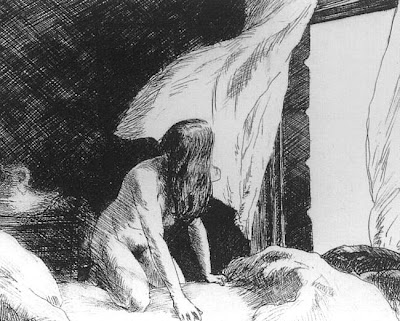 "La Toilette" (1896), by Henri de Toulouse-Lautrec
"La Toilette" (1896), by Henri de Toulouse-Lautrec
Though I value my time with friends and family, I need private space and ample opportunity to think through things on my own. I used to see this as a fault of mine, this inability to cope with reality while in the frequent presence of others, but now I suspect that it's a universal condition. I believe that each of us needs time alone, even removed from those we love the most. As
Henri Nouwen wrote,
"Solitude is the furnace of transformation. Without solitude we remain victims of our society and continue to be entangled in the illusions of the false self."
In the past, I've resorted to all manor of elaborate escape seeking solitude, from
fleeing the hemisphere to spending time in
a monastery. For the foreseeable future, however, that kind of exodus is impossible. Enter "the Man Cave".
For the last six months or more - and concluding today - I've been working on my Man Cave, formerly a one-bedroom apartment in the basement complete with bathroom and kitchen. The details of this seemingly endless campaign are too boring even for friends who care, but the tasks have included painting, electrical work, tiling, trim installation and threatening legal action against various suppliers and contractors.
I am reminded of a wonderful passage on the subject in the book, "
The Winter of Our Discontent", by John Steinbeck:
"It has no name in my mind except the Place - no ritual or formula or anything. It's a spot in which to wonder about things. No man really knows about other human beings. The best he can do is to suppose that they are like himself. Now, sitting in the Place, out of the wind, seeing under the guardian lights the tide creep in, black from the dark sky, I wondered whether all men have a Place, or need a Place, or want one and have none. Sometimes, I've seen a look in eyes, a frenzied animal look as of need for a quiet, secret place where soul-shivers can abate, where a man is one and can take stock of it."
So true.
What I've observed over the last several years is that contemporary American society does not readily tolerate a "professional" man's need for occasional solitude. At present, it is more acceptable for women to step away in order to rediscover or reinvent themselves (witness the huge success of the indulgently self-oriented book, "Eat, Pray, Love"), but men today who seek solitude as a source of strength and peace are considered apathetic, unfocused and unreliable. It remains the case that the extraordinary work of Jesus Christ, Martin Luther King, Jr., and Mahatma Ghandi (not to mention Hitler, and let's not) all included significant periods of isolation and quiet contemplation.
But I ramble. The best book on the subject that I can suggest - and I do - is "
Solitude: A Return to the Self" by Anthony Storr.
Get away.













.JPG)

